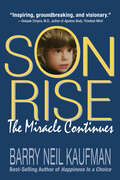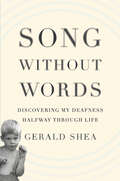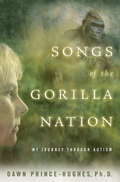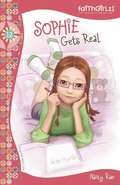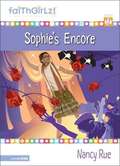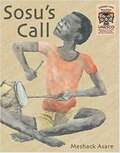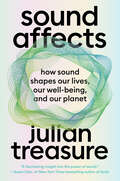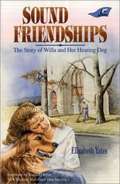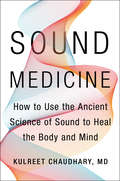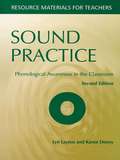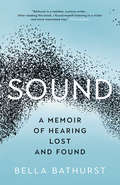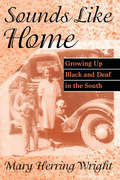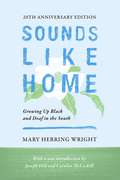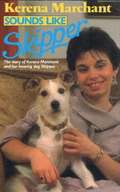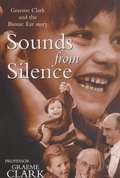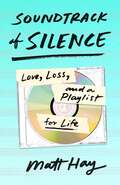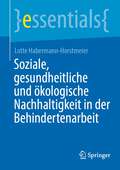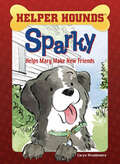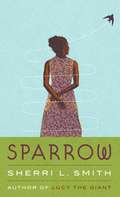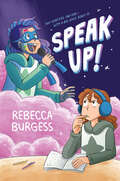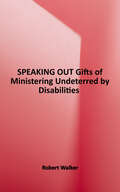- Table View
- List View
Son Rise: The Miracle Continues
by Barry Neil KaufmanIn 1979, the classic bestseller Son Rise was made into an award-winning NBC television special, which has been viewed by 300 million people worldwide. Now, Son Rise: The Miracle Continues presents not only the expanded and updated journal of Barry and Samahria Kaufman's successful effort to reach their "unreachable" child but goes beyond to include a sensitive portrayal of how that singular event has become a worldwide phenomenon. When their son Raun was a year old, he began to withdraw from human contact. Diagnosed as autistic, Raun tested with an I.Q. of under 30. Experts offered no hope and advised institutionalizing him. Barry and Samahria refused to accept this prognosis. For several years they worked with Raun in a program of their own design, based on unconditional love and acceptance. By age three and a half, Raun was functioning above his age level — a bright and curious little person. The story of the Kaufmans' experience to this point makes up Part I of Son Rise: The Miracle Continues. Part II continues Raun's story and describes the intervening years as the Kaufmans offered hope and healing to thousands of families with special-needs children. At age twenty, Raun attended a top university, and displayed a near-genius I.Q. Today, he shows no trace of his former condition. Part III of the book highlights the moving stories of five families who, guided by the Kaufmans and the Son-Rise Program, have created "rebirths" for their own special children.
Son-Rise: The Miracle Continues
by Barry Neil KaufmanThis is an expansion of the author's book Son-Rise, which appeared in the 1970s. The author recounts how he and his wife learned that their son Raun had autism, how they became disenchanted with the services of professionals, and how they ultimately developed a radical new method for working with their son at home. Rather than attempting to suppress Raun's autistic behaviors, they joined him in twirling objects, rocking, and hand-flapping as a way of relating to him. In this way they were able to build Raun's trust, with astounding results. Kaufman describes several other children who have benefited from this approach.
Song Without Words: Discovering My Deafness Halfway through Life
by Gerald Shea<P>Much has been written about the profoundly deaf, but the lives of the nearly 30 million partially deaf people in the United States today remain hidden. Song without Words tells the astonishing story of a man who, at the age of thirty-four, discovered that he had been deaf since childhood, yet somehow managed to navigate his way through Andover, Yale, and Columbia Law School, and to establish a prestigious international legal career. <P>Gerald Shea's witty and candid memoir of how he compensated for his deafness--through sheer determination and an amazing ability to translate the melody of vowels. His experience gives fascinating new insight into the nature and significance of language, the meaning of deafness, the fierce controversy between advocates of signing and of oral education, and the longing for full communication that unites us all.
Songs from the Black Chair: A Memoir of Mental Interiors
by Charles BarberDay after day, night after night, the desperate men come and sit in the black chair next to Charles Barber's desk in a basement office at Bellevue and tell of their travails, of prison and aids and heroin, of crack and methadone and sexual abuse, and the voices that plague them. In the silence between the stories, amid the peeling paint, musty odor, and flickering fluorescent light, Barber observes that this isn't really where he is supposed to be. How this child of privilege, product of Andover and Harvard and Columbia, came to find himself at home among the homeless of New York City is just one story Barber tells in Songs from the Black Chair. Interlaced with his memoir, and illuminating the nightmare of mental illness that gripped him after his friend's suicide, are the stories of his confidants at Bellevue and the "mental health" shelters of Manhattan-men so traumatized by the distortions of their lives and minds that only in the chaotic aftermath of 9/11 do they feel in sync with their world. In the intertwined narrative of these troubled lives and his own, Charles Barber brings to shimmering light some of the most disturbing and enduring truths of human nature. Charles Barber is an associate of the Yale Program for Recovery and Community Health, Yale University School of Medicine.
Songs of the Gorilla Nation: My Journey Through Autism
by Dawn Prince-Hughes Ph.D.“This is a book about autism. Specifically, it is about my autism, which is both like and unlike other people’s autism. But just as much, it is a story about how I emerged from the darkness of it into the beauty of it.”In this elegant and thought-provoking memoir, Dawn Prince-Hughes traces her personal growth from undiagnosed autism to the moment when, as a young woman, she entered the Seattle Zoo and immediately became fascinated with the gorillas.Having suffered from a lifelong inability to relate to people in a meaningful way, Dawn was surprised to find herself irresistibly drawn to these great primates. By observing them and, later, working with them, she was finally able to emerge from her solitude and connect to living beings in a way she had never previously experienced.Songs of the Gorilla Nation is more than a story of autism, it is a paean to all that is important in life. Dawn Prince-Hughes’s evocative story will undoubtedly have a lasting impact, forcing us, like the author herself, to rediscover and assess our own understanding of human emotion.
Soof: A Novel
by Sarah WeeksIn this stand-alone follow-up to So B. It (now a major motion picture), a girl who the world might see as weird finds her footing and stands her ground.All her life, Aurora has heard stories about Heidi and all the good luck she brought Aurora’s family. Aurora, though, doesn’t feel very lucky. The kids at school think she’s weird. And she’s starting to think her mom thinks she’s weird, too. Especially compared to Heidi.On the eve of a visit from Heidi, more bad luck hits Aurora’s family. There’s a fire in their attic, destroying a good part of their house. And, even worse, Aurora’s beloved dog goes missing. Aurora and her family have always believed in soof—Heidi’s mom’s word for love. But sometimes even when soof is right there in front of you, you still need to find it—and that’s exactly what Aurora is going to do.“A moving exploration of family, love, and forgiveness.” —The Horn Book“A sweet story that shows all you need is soof.” —Kirkus Reviews
Sophie Gets Real
by Nancy RueAlthough Sophie's faith is shaken after her baby sister is born with Down Syndrome and as she tries to help a troubled girl at her school, the other Corn Flakes and Dr. Peter are there to lend their support.
Sophie's Encore
by Nancy RueAlthough Sophie's faith is shaken after her baby sister is born with Down Syndrome and as she tries to help a troubled girl at her school, the other Corn Flakes and Dr. Peter are there to lend their support.
Sosu's Call
by Meshack AsareWinner of the 1999 UNESCO prize and IBBY's Outstanding Books for Young People with Disabilities award, Sosu's Call by Ghanaian author/illustrator Meshack Asare is a story of heroism and resolve. <p><p> Sosu is all alone in his family's compound when disaster strikes. The waters are rising, and most of the people of the village are in the fields. The only ones left are the very old and the very young. And Sosu, who cannot walk. Somehow he manages to make his way through the rising waters up the hill to the drum shed, where he sounds the alarm and saves the village. <p><p> A book about differences, about acceptance, about what it means to be "normal." A book about the people and the lives that take place on the other side of the world, and in our own backyard.
Sound Affects: How Sound Shapes Our Lives, Our Wellbeing and Our Planet
by Julian TreasureA "fascinating" narrative that takes readers on an epic journey spanning disciplines, continents, and centuries that spotlights sound's incredible impact on our bodies, feelings, thinking, and behavior (Susan Cain, bestselling author of Quiet). Hearing is the first sense we develop—a primary warning instinct hardwired into our brains. And yet, in an increasingly noisy and distracted world, most people pay very little attention to sound. In school, we teach reading and writing, but not listening. Conscious listening is rare, and, with over half the world's population now living in cities, billions of people never experience the rich and health‑enhancing sounds of the natural world. Every day, the sounds around us affect our experience and fundamentally alter our quality of life, for better or worse. In four sections—geophony, the sounds of the planet; biophony, the "great animal orchestra"; anthropophony, the sounds of humanity; and silence, a sound in its own right—this book will help readers rediscover the wonder of sound and understand how powerfully it affects us, whether we're paying attention or not. It will also offer readers a manual for taking back responsibility for the sounds we consume and the sounds we make, so we can enhance our own happiness.
Sound Friendships: The Story of Willa and Her Hearing Dog
by Elizabeth YatesFrom the book Jacket: Sound Friendships is the story of Willa Macy, who lost her hearing when she was fourteen years old, and Honey, a golden retriever, who helped her to discover a new world of independence and security. It is also a story about Hearing Dogs-their background, training, special abilities, and the unique relationship they develop with their owners in working to surmount the barriers of a physical handicap.
Sound Medicine: How to Use the Ancient Science of Sound to Heal the Body and Mind
by Kulreet Chaudhary M.D.From a leading neurologist, neuroscientist and practitioner of Ayurvedic medicine, comes a rigorous scientific investigation of the healing power of sound, showing readers how they can use it to improve their mental and physical wellbeing. Why does a baby’s cry instantaneously flood a mother’s body with a myriad of stress hormones? How can a song on the radio stir up powerful emotions, from joy to anger, regret to desire? Why does sound itself evoke such primal and deeply felt emotions?A vibration that travels through air, water and solids, sound is produced by all matter, and is a fundamental part of every species’ survival. But there is a hidden power within sound that has only just begun to be investigated. Sound Medicine takes readers on a journey through the structure of the mouth, ears, and brain to understand how sound is translated from acoustic vibrations into meaningful neurological impulses. Renowned neurologist and Ayurvedic expert Dr. Kulreet Chaudhary explains how different types of sound impact the human body and brain uniquely, and explores the physiological effects of sound vibration, from altering mood to healing disease.Blending ancient wisdom with modern science, Dr. Chaudhary traces the history of sound therapy and the use of specific mantras from previously unknown texts—traced back to the Siddhas, a group of enlightened yogis who created a healing tradition that served as the precursor to Ayurvedic medicine—to explain the therapeutic application of sounds for a wide range of conditions. Sound Medicine offers practical, step-by-step lessons for using music and mantras, whether you’re a beginner or searching for a more advanced practice, to improve your health in body, mind, and spirit.
Sound Practice: Phonological Awareness in the Classroom (Resource Materials For Teachers Ser.)
by Lyn Layton Karen DeenyThe second edition of Sound Practice looks afresh at how young children can be helped to discover basic facts about an alphabetic spelling system, within the context of their developing spoken language. It examines why children might fail to understand letter-sound links; the origins of severe and persistent difficulties with achieving functional literacy skills; and developmental processes underpinning the areas of learning identified in national initiatives for promoting children's learning. The book also discusses the need for differentiation strategies to respond to individual children's learning needs within national initiatives, and techniques and approaches that can be effectively applied to fulfil curriculum objectives. Phonological awareness is the key to independent literacy and must be explicitly tackled in the classroom in order to promote early reading and writing and to address written language difficulties in older children. This book is a suitable resource for initial and in-service training for teachers and teaching assistants and includes photocopiable worksheets.
Sound: A Memoir of Hearing Lost and Found
by Bella Bathurst&“A moving and fascinating book about sound and what it means to be human&” from the Somerset Maugham Award–winning author of The Lighthouse Stevensons (Financial Times). In this surprising and moving book, award-winning writer Bella Bathurst shares the extraordinary true story of how she lost her hearing and eventually regained it and what she learned from her twelve years of deafness. Diving into a wide-ranging exploration of silence and noise, she interviews psychologists, ear surgeons, and professors to uncover fascinating insights about the science of sound. But she also speaks with ordinary people who are deaf or have lost their hearing, including musicians, war veterans, and factory workers, to offer a perceptive, thought-provoking look at what sound means to us. If sight gives us the world, then hearing—or our ability to listen—gives us our connections with other people. But, as this smart, funny, and profoundly honest examination reveals, our relationship with sound is both more personal and far more complex than we might expect. &“Bathurst is a restless, curious writer . . . After reading this book, I found myself listening in a richer and more interested way.&” —The Guardian &“A hymn to the faculty of hearing by someone who had it, lost it and then found it again, written with passion and intelligence . . . terrifying, absorbing and ultimately uplifting.&” —Literary Review &“Bathurst&’s affecting memoir will enlighten and educate.&” —Publishers Weekly &“A memoir of hearing loss and what the author learned . . . through her unexpected recovery from it. A good writer knows material when it presents itself, and Bathurst is a very good writer.&” —Kirkus Reviews
Sounds Like Home: Growing Up Black and Deaf in the South
by Mary Herring WrightMary Herring Wright's memoir adds an important dimension to the current literature in that it is a story by and about an African American deaf child. The author recounts her experiences growing up as a deaf person in Iron Mine, North Carolina, from the 1920s through the 1940s. Her story is unique and historically significant because it provides valuable descriptive information about the faculty and staff of the North Carolina school for Black deaf and blind students from the perspective of a student as well as a student teacher. In addition, this engrossing narrative contains details about the curriculum, which included a week-long Black History celebration where students learned about important Blacks such as Madame Walker, Paul Laurence Dunbar, and George Washington Carver. It also describes the physical facilities as well as the changes in those facilities over the years. In addition, Sounds Like Home occurs over a period of time that covers two major events in American history, the Depression and World War II. Wright's account is one of enduring faith, perseverance, and optimism. Her keen observations will serve as a source of inspiration for others who are challenged in their own ways by life's obstacles.
Sounds Like Home: Growing Up Black and Deaf in the South
by Mary Herring WrightOriginally published in 1999, Sounds Like Home adds an important dimension to the canon of deaf literature by presenting the perspective of an African American deaf woman who attended a segregated deaf school. Mary Herring Wright documents her life from the mid-1920s to the early 1940s, offering a rich account of her home life in rural North Carolina and her education at the North Carolina School for the Deaf and Blind, which had a separate campus for African American students. This 20th anniversary edition of Wright’s story includes a new introduction by scholars Joseph Hill and Carolyn McCaskill, who note that the historical documents and photographs of segregated Black deaf schools have mostly been lost. Sounds Like Home serves “as a permanent witness to the lives of Black Deaf people.”
Sounds Like Skipper: The Story of Kerena Marchant and Her Hearing Dog Skipper
by Kerena Marchant<P>Skipper is a shaggy-haired Jack Russell, one of the earliest dogs trained in a new scheme to help people suffering from deafness. The author, a permanent researcher for BBC TV, has been deaf since infancy. Modern technology can equip her with a special high-powered hearing aid, but Skipper enables her to live alone, summoning her to doorbells and telephones, waking her when the alarm rings, and warning her of such unexpected hazards as burglars or fire alarms. The author's story of life with Skipper is full of insights into the plight of the deaf in contemporary society. <P>Kerena tells her story of how she received Skipper a Jack Russell terror mix dog, and how his presence changed her life. She also discusses some problems that she experienced as a almost deaf person in a hearing world, and her experiences with the deaf community too.
Sounds from Silence: Graeme Clark and the Bionic Ear Story
by Graeme ClarkThe author's interest in the development of improved hearing devices for the deaf arose from his interactions with his own father, who lost his hearing. Having worked in a pharmacy, Graham Clark developed a keen interest in pursuing a medical degree. His research and tenacity led him to develop the multiple contact bionic ear. The book takes us on a journey with the author through his life and his perseverance to develp this device.
Soundtrack of Silence: Love, Loss, and a Playlist for Life
by Matt HayAn inspiring memoir of a young man who discovered he was going completely deaf just at the moment he’d fallen in love for the first time.As a child, Matt Hay didn’t know his hearing wasn’t the way everyone else processed sound—because of the workarounds he did to fit in, even the school nurse didn’t catch his condition at the annual hearing and vision checks. But by the time he was a prospective college student and couldn’t pass the entrance requirements for West Point, Hay’s condition, generated by a tumor, was unavoidable: his hearing was going, and fast.A personal soundtrack was Hay’s determined compensation for his condition. As a typical Midwestern kid growing up in the 1980s whose life events were pegged to pop music, Hay planned to commit his favorite songs to memory. He prepared a mental playlist of the bands he loved and created a way to tap into his most resonant memories. And the track he needed to cement most clearly? The one he and his new girlfriend, Nora—the love of his life—listened to in the car on their first date.Made vivid with references to instantly recognizable songs—from the Eagles to Elton John, Bob Marley to Bing Crosby, U2 to Peter Frampton—Soundtrack of Silence asks readers to run the soundtrack of their own lives through their minds. It’s an involving memoir of loss and disability, and, ultimately, a both unique and universal love story.
Soziale, gesundheitliche und ökologische Nachhaltigkeit in der Behindertenarbeit (essentials)
by Lotte Habermann-HorstmeierUm Menschen mit geistiger Behinderung ein nachhaltiges, gesundes Leben zu ermöglichen, braucht es eine nachhaltig gesundheitsfördernde Lebenswelt, die in ein gesundes Ökosystem eingebettet ist, sowie eine sie tragende Gesellschaft, die das Wohl aller Menschen und die Unversehrtheit ihrer natürlichen Umwelt im Blick hat.
Space and Self: Active Learning by Means of the Little Room
by Lilli NielsenIn 1980 Dr. Nielsen, a Danish educator, was asked to evaluate a 20-month-old blind boy who was severely developmentally delayed. Her observations of this child helped her formulate ideas that led to her creation of the "Little Room", a structured environment through which blind children can learn to explore their surroundings. Nielsen's approach is known as "active learning," as the child becomes motivated to experiment and explore when his surroundings are interesting and when he/she is free from adult interference. This book is packed with specific suggestions for parents and teachers, and gives a detailed explanation of the "Little Room" and how it should be used.
Sparky Helps Mary Make Friends (Helper Hounds)
by Caryn RivadeneiraMary's new in town. She’s worried about starting classes at her new school. That's why her mom calls the Helper Hounds—and why Sparkplug, the wildly handsome, wickedly smart, card-carrying, world-famous Helper Hound is on the scene. Sparky knows a thing or two about moving. He moved four times as a puppy, and learned to make new friends along the way. Sparky knows he can teach Mary all his best tricks and help her meet new friends, too. At least Sparky thought he could until he met Custard, Mary's persnickety cat. Will Sparky's best tricks be enough to win over Custard and show Mary making friends is nothing to fear?
Sparrow
by Sherri L. SmithFamily sticks with family. That’s the golden rule G’ma taught Kendall. But once G’ma’s gone, Kendall has no family left—except for an aunt G’ma asked for at the end, who Kendall barely remembers. Only Aunt Janet knows what G’ma had in mind, but she never even shows up at the funeral. With child services on Kendall’s case and just 10 days to get her apartment lease renewed, Kendall sets out for Janet’s home in New Orleans to get her life in order—and her questions answered. But what she finds are ne...
Speak Up!
by Rebecca BurgessFor fans of Click and Brave, this touching coming-of-age middle grade graphic novel debut follows an autistic girl who finds friendship where she least expects it and learns to express her true self in a world where everyone defines her by her differences.Twelve-year-old Mia is just trying to navigate a world that doesn’t understand her true autistic self. While she wishes she could stand up to her bullies, she’s always been able to express her feelings through singing and songwriting, even more so with her best friend, Charlie, who is nonbinary, putting together the best beats for her.Together, they've taken the internet by storm; little do Mia’s classmates know that she’s the viral singer Elle-Q! But while the chance to perform live for a local talent show has Charlie excited, Mia isn’t so sure.She’ll have to decide whether she’ll let her worries about what other people think get in the way of not only her friendship with Charlie, but also showing everyone, including the bullies, who she is and what she has to say.
Speaking Out: Gifts of Ministering Undeterred by Disabilities
by Edited by Robert L. WalkerReaders of "Speaking Out: Gifts of Ministering Undeterred by Disabilities" will enter the worlds of one Episcopal and 24 United Methodist ministers who cope with various forms of disabilities. Read how each one is a living testimony that will surprise, inspire, and remind you that they are people with God-given gifts who were spiritually strengthened during their individual life journeys, all the while remaining faithful to their respective calls to church ministry. <p><p>Unfortunately, people with disabilities frequently experience physical and discriminatory barriers, several of which are described by the contributors to this book; undeterred, they overcame or are overcoming the barriers through grace, resiliency, and support from many sources. The book focuses on ministers, but their stories are applicable to non-ministerial persons in our all too common negating ways of both the sacred and secular societies. <p><p>This book is sponsored by the United Methodist Association of Ministers with Disabilities (UMAMD), and all royalties from sales of the book will go to the UMAMD in support of its activities.
